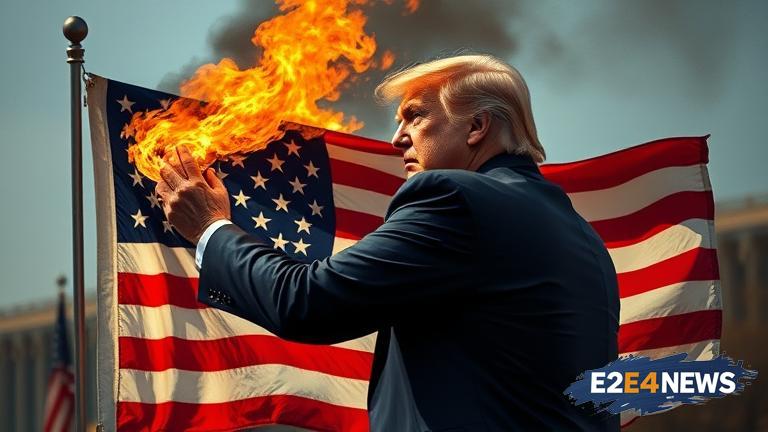The debate over flag burning has been a longstanding issue in the United States, with many arguing that it is a form of free speech protected by the First Amendment. However, others see it as a disrespectful and unpatriotic act. Trump’s call for a ban on flag burning has been met with criticism from civil liberties groups, who argue that it would be a violation of the right to free speech. The American Civil Liberties Union (ACLU) has stated that flag burning is a form of symbolic speech that is protected by the Constitution. The Supreme Court has also ruled that flag burning is a form of protected speech, in the 1989 case of Texas v. Johnson. Despite this, Trump has continued to push for a ban on flag burning, citing it as a matter of national pride and respect for the military. However, many veterans and military families have spoken out against the ban, arguing that it would be a betrayal of the values of freedom and democracy that they fought to protect. The issue of flag burning has also been linked to the Black Lives Matter movement, with some protesters using flag burning as a form of protest against police brutality and systemic racism. Trump’s call for a ban on flag burning has been seen by some as an attempt to suppress the movement and silence the voices of marginalized communities. The ban has also been criticized by artists and activists, who see it as a form of censorship and a threat to creative freedom. The US flag has a long history of being used as a symbol of protest and dissent, from the anti-war movement of the 1960s to the present day. Burning the flag has been used as a form of protest against a range of issues, including war, racism, and government corruption. However, it has also been used as a form of hate speech and intimidation, with some individuals using it to target minority groups and promote bigotry. The issue of flag burning is complex and multifaceted, and there are valid arguments on both sides. While some see it as a form of protected speech, others see it as a form of disrespect and hatred. Ultimately, the decision to ban flag burning would require a constitutional amendment, which would be a difficult and contentious process. The controversy over flag burning has sparked a wider debate about the role of free speech in American society, and the balance between protecting national symbols and preserving individual rights. As the debate continues, it is clear that the issue of flag burning will remain a contentious and divisive issue in American politics. The call for a ban on flag burning has also raised questions about the limits of free speech and the role of government in regulating forms of expression. While some argue that flag burning is a form of hate speech that should be banned, others see it as a form of protest that is essential to a healthy democracy. The issue has also been linked to the wider debate over patriotism and national identity, with some arguing that flag burning is a form of anti-Americanism. However, others see it as a form of patriotism, as it is a way of expressing dissent and holding the government accountable. The controversy over flag burning has sparked a wider conversation about the meaning of patriotism and the role of dissent in American society. As the debate continues, it is clear that the issue of flag burning will remain a complex and contentious issue in American politics.
